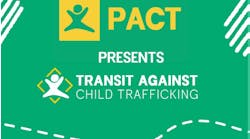How do you creatively and humanly find a way to control a problem pigeon population? Bird birth control.
TransLink in Vancouver, B.C., is partnering with BC SPCA to dispense OvoControl, a non-toxic, effective and, TransLink stresses, humane contraception that has successfully been used in other cities to prevent pigeon reproduction and reduce populations naturally through attrition. The birth control will be dispensed using an automatic bird feeder at VCC-Clark SkyTrain Station. Pigeons that ingest the bait pellets on a regular basis will not be able to fertilize eggs. TransLink explains that studies show a 50 percent to 90 percent reduction in OvoControl managed pigeon populations.
This isn't the agency's first effort to control the pigeon population at VCC-Clark SkyTrain Station. TransLink has installed netting at stations to stop birds from getting into empty spaces, set up spikes and strips to deter pigeons from roosting on flat surfaces and even hired a falconer to patrol stations with the most pigeons as part of another pilot project.
Dr. Sara Dubois, chief scientific officer with the BC SPCA, explains pigeons can breed rapidly, but their urban lifespans are short. With fewer new pigeons born, the pigeon population around SkyTrain stations will reduce naturally and cause fewer operational issues.
“OvoControl has been approved for use by Health Canada and only has contraceptive effects in birds. Pigeons must eat their daily dose (5g/bird) for the contraceptive to work, and it is designed to be fed in a manner to maximize pigeon feeding behavior. We are happy TransLink is ready to partner with us and research what could be a very effective and humane long-term solution,” said Dr. Dubois.
TransLink says that pigeon droppings are not only messy, but also pose a safety concern. Pigeons trigger track intrusion alarms, causing TransLink's driver-less trains to brake automatically. These hard stops can lead to customer falls and service delays.
TransLink customers and the public can help by not feeding the birds. Outside foods sources encourage birds to roost inside stations and can draw pigeons away from the contraceptive pellets. It is vital for the success of the project that people stop feeding pigeons in this area.
TransLink says that if the OvoControl pilot is successful at VCC-Clark, it may be expanded to other stations.
Vancouver animal groups have voiced their support of the project.
“[The Wildlife Rescue Association of BC] strives to reduce human-wildlife conflict in the urban environment and rehabilitates injured and orphaned wildlife. This project aims to humanely reduce the number of pigeons at areas that have a lot of potential casualties and injuries in pigeons. This project will reduce the number of injured, deceased and orphaned pigeons in these areas. Wildlife Rescue supports the BC SPCA in promoting humane wildlife management practices,” said Linda Bakker, co-executive director of the Wildlife Rescue Association.
Michael Austin, executive director of the Vancouver Humane Society, added, “While we continue to grow our wonderful city, it is important to consider the impact such developments have on urban wildlife; Vancouver Humane is pleased to support this initiative by TransLink and the BC SPCA to humanely control the pigeon population in order to reduce unnecessary suffering. We hope that other businesses can learn from this work and that more considerations are made for the non-human animals that live in our communities.”




